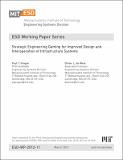Strategic Engineering Gaming for Improved Design and Interoperation of Infrastructure Systems
Author(s)
Grogan, Paul T.; de Weck, Olivier L.
Downloadesd-wp-2012-11.pdf (588.4Kb)
Metadata
Show full item recordAbstract
Large physical networks of interrelated infrastructure components support modern societies as a collaborative system with significant technical and social complexity. Design and evolution of infrastructure systems seeks to reduce wasted resources and maximize lifecycle value. Interdependencies between constituent systems call for an integrative approach to improve interoperation but many existing techniques rely on centralized development and emphasize technical aspects of design. This paper presents a simulation gaming approach to collaborative infrastructure system design leveraging the technical strengths of simulation models and the social strengths of multi-player engagement in a game execution. In a strategic engineering game, models representing each constituent infrastructure system share a common graph-theoretic modeling framework and are integrated using the HLA-Evolved standard for interoperable federated simulations. A prototype game instantiation based on a space-based resource economy supporting future space exploration is discussed with the objective of identifying how factors of game play influence insights to collaborative system design. Future work seeks to develop, execute, and evaluate the prototype game to further research the use of simulation games in supporting collaborative system design.
Date issued
2012-03Publisher
Massachusetts Institute of Technology. Engineering Systems Division
Series/Report no.
ESD Working Papers;ESD-WP-2012-11